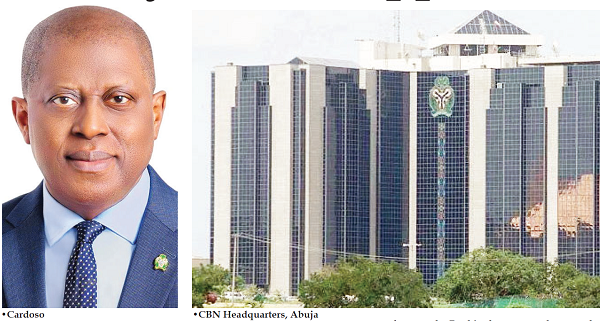
Keep up with the latest news and be part of our weekly giveaways and airtime sharing; follow our WhatsApp channel for more updates. Click to Follow us
Nigerian banks are channelling nearly three-quarters of their loans towards the development of the private sector, highlighting the significant influence of banks on national economic development. Data from the Central Bank of Nigeria (CBN) reveals that banks’ credit to the private sector (CPS) reached N73.66 trillion by the end of February 2025, surpassing the N26.5 trillion lent to the public sector.
The report shows a marginal 3.4% increase in CPS to N73.66 trillion in February 2025, up from N71.21 trillion in February 2024. In contrast, banks’ credit to the government rose by 35.2% to N26.5 trillion in February 2025, indicating increased government borrowing from domestic banks for deficit financing.
For further information, read more details here
Analysts from Cordros Securities predict that the shift towards monetary policy easing at the next MPC meeting in May will support growth in credit to the private sector. “In the near term, we expect the shift toward monetary policy easing at the next MPC meeting in May to support growth in the credit to private sector. Nonetheless, credit to private sector growth is expected to remain subdued compared to the previous year, as the impact of currency depreciation on banks’ foreign-denominated assets continues to fade given the more stable naira exchange rate.”
The Treasury bills secondary market experienced a bearish trend last week, driven by market participants selling off bills in anticipation of higher stop rates at the primary market auction. Consequently, the average yield expanded by 85 basis points to 21.7%. Meanwhile, the FGN bond secondary market was bullish, with the average yield declining by 3bps to 18.7%.
Analysts attribute this to secondary market bids by investors who lost out on the auction amid the sizeable non-competitive allotment of NGN152.45 billion (36% of total allotment). “We attribute this to secondary market bids by investors who lost out on the auction amid the sizeable non-competitive allotment of NGN152.45 billion (36% of total allotment).”
“Across the benchmark curve, the average yield decreased at the short end (-34bps) following demand for the March-2027 (-43bps) bond, while it advanced at the mid (+8bps) and long (+20bps) segments driven by selloffs of the April-2032 (+15bps) and March-2035 (+48bps) bonds, respectively,” they said.
The analysts further noted that the bearish trend in the Treasury bills secondary market was driven by market participants’ expectations of higher stop rates at the primary market auction. “Consequently, the average yield expanded by 85 basis points to 21.7%. Across the market segments, the average yield advanced by 15 basis points and 168 basis points to 19.4% and 24.2% in the NTB and OMO segments, respectively.”
At the NTB auction held on Wednesday, the CBN offered bills worth N700.00 billion, comprising N80.00 billion for the 91-day, N120.00 billion for the 182-day, and N500.00 billion for the 364-day bills.
The report highlights the significant role of banks in supporting the private sector, with nearly three-quarters of their loans channelled towards private sector development. As the economy continues to navigate the challenges of inflation and currency fluctuations, the banking sector’s commitment to supporting private sector growth remains crucial for Nigeria’s economic development
Please don’t forget to “Allow the notification” so you will be the first to get our gist when we publish it.
Drop your comment in the section below, and don’t forget to share the post.







